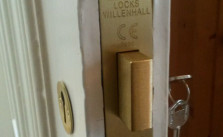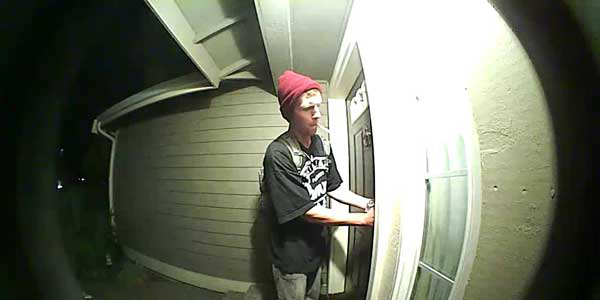
Securing Your Property
Security Essentials
Take a close look about your property: Does it encourage or discourage a would-be intruder?
Most of the top ways to enhance the security of your building are remarkably simple. Clever property maintenance, effective lighting, and a number of effective locks go a big way in decreasing your properties attraction to intruders.
When assessing your properties security, begin by evaluating two P’s: Perimeter And Point of Entry. That’s the way a intruder would consider your building.
Perimeter applies to the grounds and outside night lighting. Trees and bushes placed near to the property and left unattended provide ready cover to a burglar. A garden without walls makes getting in and out quicker. A ladder or equipment left on the garden can be used to get in.
If these issues make your building look tempting during daylight hours, a burglar may return at night to check things out. A property left in the dark all night, inside or out, isn’t going to provide any information of illicit activities and renders a criminals entering and departure almost undetectable
Points of entry are, of course, all your doors and windows – even windows above the first floor. If you leave any windows or doors open most of the time or if they are in obvious poor repair, a burglar can get in or out quickly. Start by evaluating exterior doors – nearly 90% of all illegal entries are right through your door.
For some more specific advice on evaluating the security of your home, follow our list of security tips I will give you an idea of what you need to do to improve your home security. And, you’ll want to consider how you live in your home. For example, if you have good locks but often don’t bother to use them, getting better locks won’t increase your security. Getting in the practice of locking the door will help.
Your family’s lifestyle is especially important when evaluating new locks and installing an electronic alarm system. These systems have become fairly popular, and the options available are staggering. If you have a good idea of how your family will use the security system you’re much more likely to get what you need – not too much, not too little. And these systems work best in homes that have covered the security basics.
The goal is to feel safe and comfortable in and around your home. Keep that in mind as you evaluate your home and prioritise the list of security home improvement projects.
How Secure Is Your Home?
You want to improve your home’s security, but you’re not sure where to start. Evaluating it, inside and out with this questionnaire will give you a good overall security picture, and the weakest spots will likely jump out at you.
You probably won’t be surprised by the results. Some things you likely know need to be corrected, but the haven’t been a priority to you. Replacing a door lock isn’t the most glamorous of home improvement projects. Other things you may have allowed for the sake of convenience, such as a key stashed under the mat or hidden in the garage. Even a third-rate burglar who is mildly determined to get into your house will look for a key
Be objective. You create a false sense of security when you downplay your home’s current shortcomings – a door that wiggles in it’s frame, even if it’s just a touch, is not secure. Conversely, there is no need to panic about short comings – adding a deadbolt is most likely sufficient to secure a solid door that’s in a reinforced frame; rebuilding the door is going a tad overboard.
Location and Lifestyle
- Have there been four or more burglaries in your neighbourhood in the last few years?
- Do you live a few blocks from a major highway or adjacent to a wooded area?
- Is your home unoccupied at regular times each day?
- Do you have unusually valuable jewellery, artwork, collections, or electronic equipment in your home?
- Do you live on a cul-de-sac?
- Does your neighbourhood lack a program for keeping an eye out for criminal activity?
An answer of yes to any of the above means you could have an above average risk of a break-in – and now is the time to evaluate and improve the security of your home and neighbourhood.
The House
-
- Do you keep a spare house key under a mat, in a flowerpot, or elsewhere outside?
- Do you have hollow-core doors leading into your house from the outside?
- Are any of your exterior doors not secured by a heavy-duty dead-bolt lock and reinforced strikeplate?
- Can your expensive stereo or computer system be easily seen by looking in the window?
- Is your pet door large enough to allow a person to squeeze through?
All of these make your house a more attractive target to burglars. All of them are relatively easy to fix. Now is the time to focus on these shortcomings and correct them.
The Garden
-
-
- Could a tree branch give an agile climber access to a second-story window or balcony?
- Do overgrown trees or shrubs prevent any of your doors or windows from being seen from the street or from a neighbour’s house?
- Are all sides of your house well-lighted at night or equipped with motion-sensitive lights?
- Is your lawn well-maintained, or does it look like your home may be unoccupied?
- Do you leave valuable lawn and garden equipment in your garden?
-
Home security is more than locks and solid doors. If a burglar can get close to your house without being detected, he has more time to get inside without being noticed. Your garden says a lot to a burger casing homes in your neighbourhood. Make sure your home tells the intruder to get lost!
-
-
- Do you use timers on some lights?
- Do you leave any doors or windows unlocked?
- Is your mail or newspaper picked up every day by a friend or neighbour?
-
When you’re on holiday, your house should look as though you’re still home.
